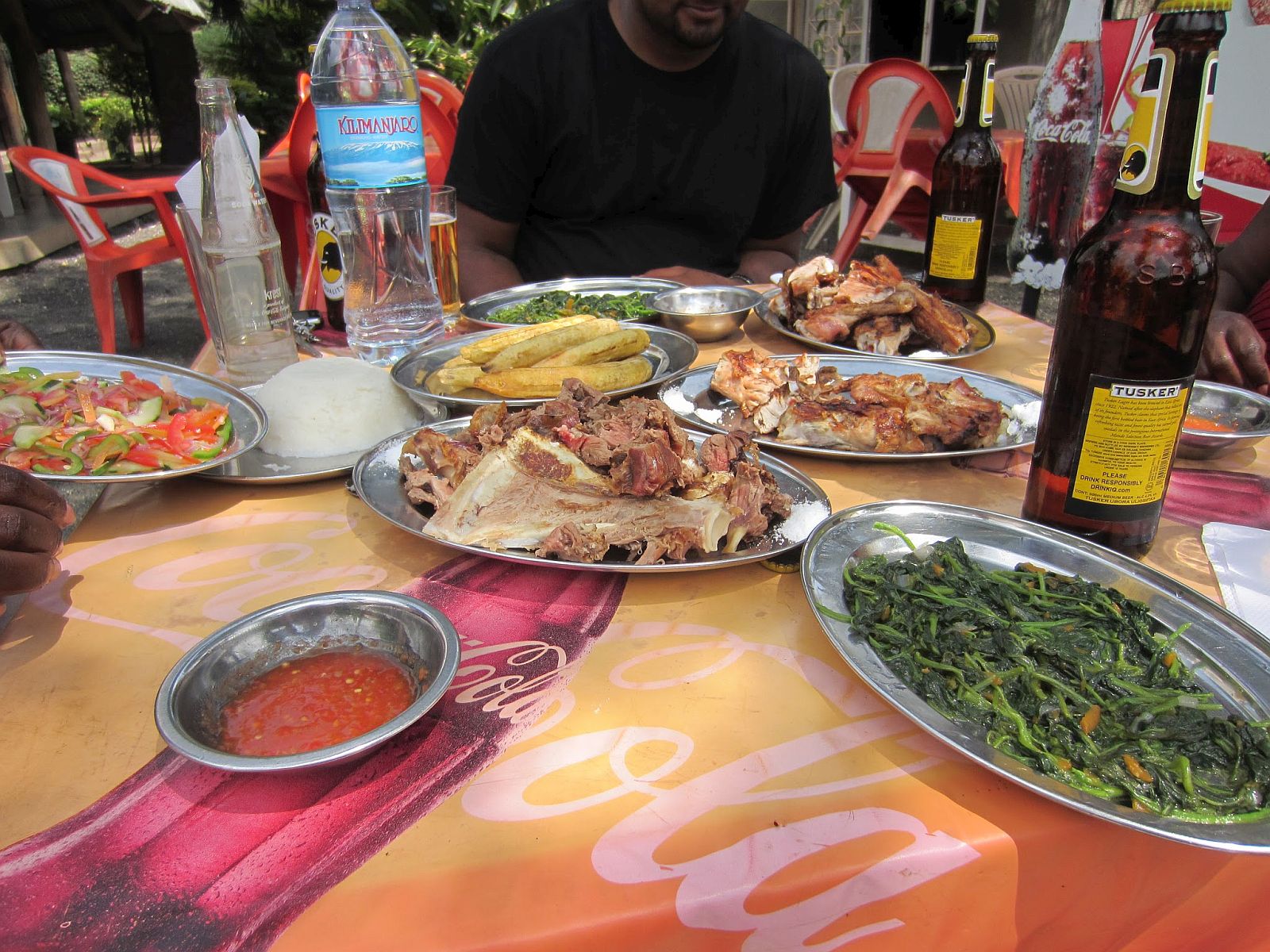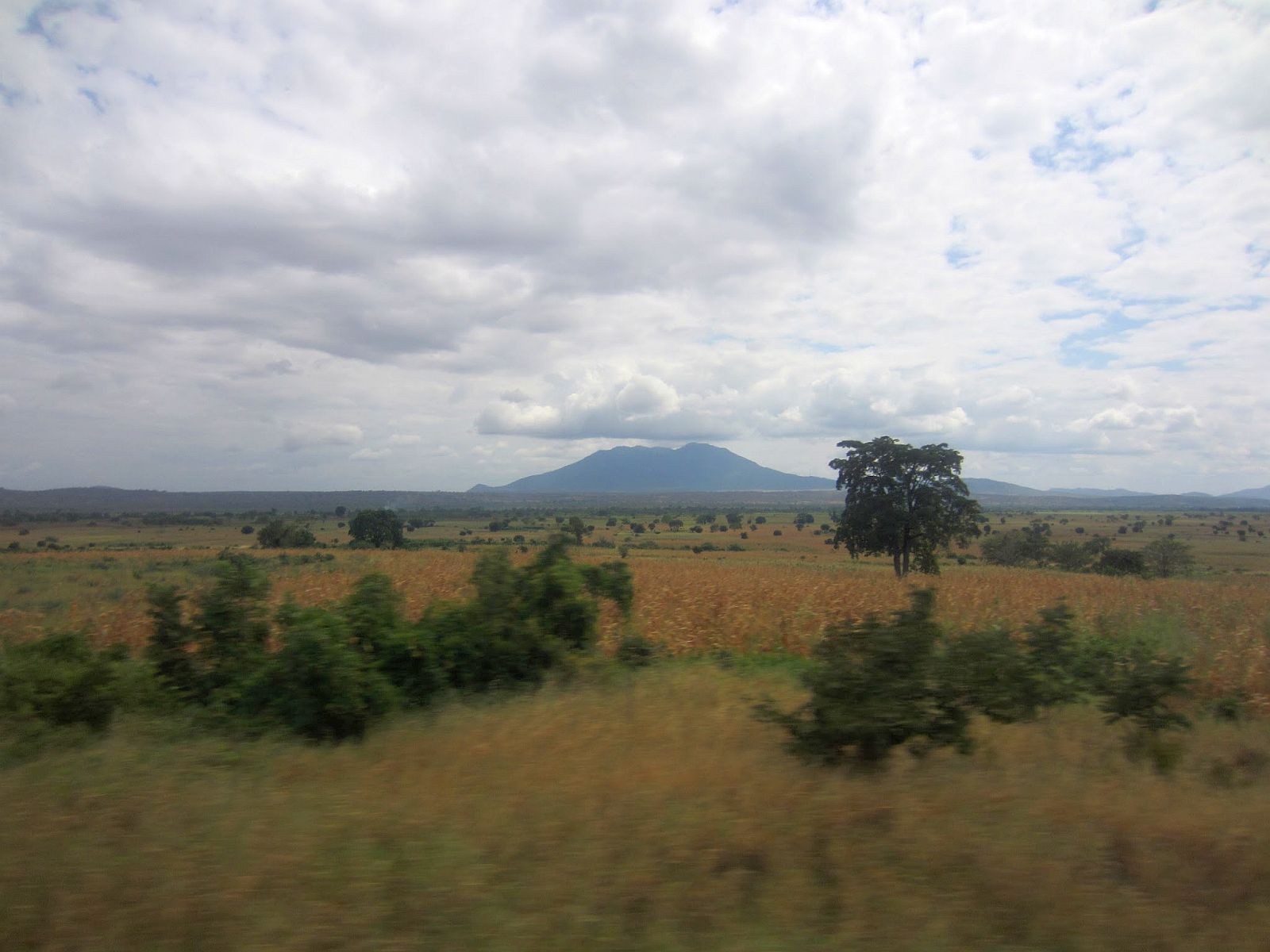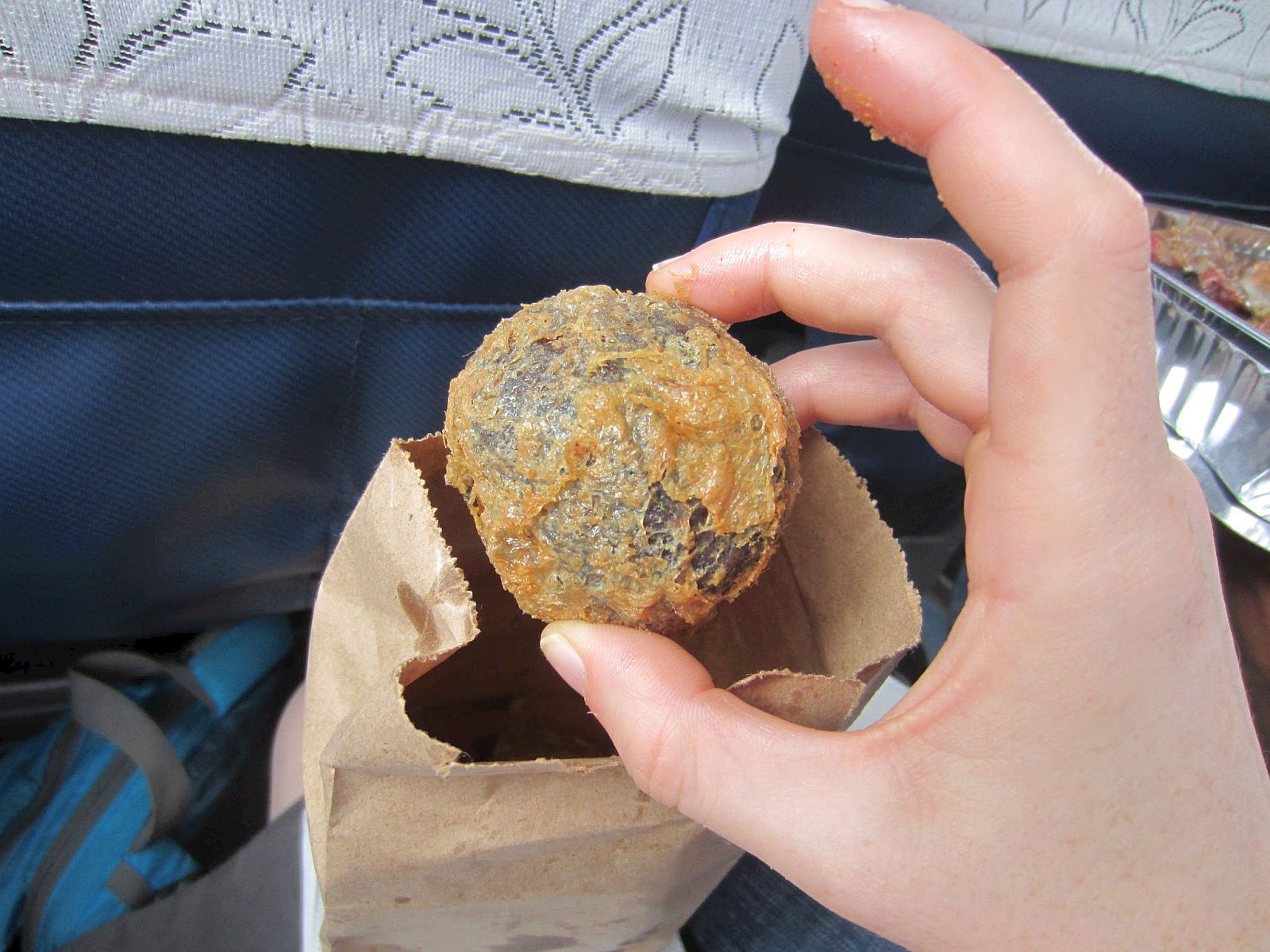The Bus to Mwanza

The summer before we were married my husband introduced me to Tanzania. Within two weeks we crossed the country from east to west, smelling our way through a spice tour on Zanzibar, sipping Tusker lager at the Mweka gate of Mount Kilimanjaro and following an elephant family through the dried up Tarangire riverbed while on safari. However, those excursions were all sideshows to the main event: visiting family, which means eating with family. Every other day we traveled to a new city or village where I would meet new aunts, uncles and cousins who force-fed me until I could only wear my drawstring pants. There was a two-plate minimum at every meal. It is a delicious and dangerous style of hospitality.
Throughout our stay we covered short distances between relatives by car and long distances by bus. The highways were smooth and we were on typical charter coaches but with beverage service. The condensation would form quickly on my Fanta and create a damp ring when I let it rest on my thigh. As we cruised down the road with a cold glass bottle in hand, I watched mounted televisions cycle through a series of choreographed church choirs.
Our longest leg of travel was from mountainous Arusha to lakeside Mwanza, a 12-hour bus ride that began before dawn. We went to the station the day before to buy tickets. To avoid any missteps, we handed over money for the transaction to our cousin and waited in the car. Our Swahili was limited to common courtesy words of which even those I muddled. Earlier in the day I had responded to the respectful “Shikamo” offered by a young boy by returning the exact same greeting. His shocked eyes turned into a fit of giggles at the expense of the visiting mzungu, who had just acknowledged him as an elder instead of recognizing his respect with “Marahaba.”
After the tickets were safely tucked away in our canvas travel pouches we went home to enjoy the most delicious meal of the trip. As we sat to dine, our plates clanged against the metal serving dishes — all available table space was utilized. I started out with starch, a scoop of plain white rice and a chunk of ugali, which is a maize porridge (similar to polenta) cooked into a dough-like consistency.
As I rolled a bite sized ball of the gritty dough in my right hand, I was overwhelmed with the choices for accompaniment. The chicken slaughtered that morning had stewed in a sauce of tomatoes, onions, garlic and turmeric root until your tongue could mistake its texture for cream. A portion of goat had simmered for hours in a pot of hot peppers and was served with a word of caution.
The second goat dish was my favorite staple, nyama choma, sinewy rib meat seared over coals to a charred perfection. Sukuma wiki was sautéed with more of nature’s candy and the tang of the dark leafy greens was perfectly tempered by the caramelized onions. Golden sweet potatoes were boiled then crisped around the edges in a thin layer of oil. Baked pilau showed off the country’s sweet spices as the rice, chunks of chicken and diced carrots mingled with cinnamon, cloves and coriander. Coconut burst onto my tongue with each bean I chewed as though its innards had been replaced with the tropical fruit’s flesh.
We ate three full dinner plates each instead of the required two. A bowl of sweet mangoes accompanied the chai that completed our meal. That night, as the food from our farewell meal settled, we packed our belongings and set the alarm to ring before the sun would rise.

While food was the main element of hospitality, assurance for safety and comfort were a close second and third. Like a helicopter parent at a middle school dance, our cousin walked us onto the bus, located our seats to make sure no one else was sitting in them and talked to the bus driver and attendant. He told them the obvious: we were Americans traveling mute with no Swahili. As if it wasn’t already clear who we were, I was the only mzungu on the bus.
We traveled through grasslands surrounding Ngorongoro Crater and along the southern rim of the Serengeti. The earth transitioned from flowing grass to dusty mounds and back again, but always maintained a golden hue. Flat-topped acacia trees dotted the landscape, their limbs extending outward instead of upward, as though their growth was inspired by the horizon.
The green leaves of the trees towered above the more frequent green bushes, all at once creating a complexity and a monotony as our bus rolled up and down the hills. Signs of human activity enhanced the natural landscape. Round, thatched-roof homes built by the Masaai popped up in a sudden, small cluster and the settlements could go unnoticed except for the flare of their residents’ red shukas. The larger villages announced themselves more slowly, one cement block house after another until we reached a clear center of town.
Each village looked similar to me, advertisements for Vodacom and Coca Cola covered tin roofs across the country. Buildings alternated between primary colors and earth tones with an artistic expression an urban planner would covet. Block fences were common around homes of any size and everyone had the same uncomfortable plastic chairs sitting outside their doors. The bus attendant would call out the village names and a few people would disembark each time. Just as the villages were indistinct due to my unfamiliarity, all of their names sounded similar to my untrained ear as well.
On a previous bus trip there was a rest stop about halfway through the journey. The pit toilets were clean, the concessions were delightful and we were told that the bus would leave in 15 minutes. The bus left after precisely 15 minutes. The lone passenger who was not back in his seat scrambled to hire a motorcycle to catch up to his intended mode of transportation. His traveling partners had begged the driver to hold on for 45 seconds in the parking lot to no avail. As the bus pulled away I didn’t need an interpreter to understand their real-time updates. “He’s pulling out of the lot! He’s behind the bus! He’s beside the bus!”
However, it wasn’t until we encountered a stop sign miles down the road that the driver paused to open the door to this tardy motorcycle-hopping fellow.

I was not interested in being left in the middle of Tanzania with family hours away. I did not trust my ability to hire a motorcycle or do anything but sit down in the middle of the dirt and cry if we were to be left behind. Especially because, you know, Swahili.
Therefore, when the bus stopped about two hours into our twelve-hour journey my pit stop was quick. It consisted of only a nyama choma purchase from the closest vendor and a hurried toilet trip.
We sunk safely back into our seats, watched the choir videos and relaxed while the bus drove on and on and on and on. And on.
Based on our previous trips, I had assumed there would be a pit stop around lunch time. Noon came and went yet somehow the bus continued. I stopped drinking my complimentary Fanta, concerned that my bladder may not hold. The bus was still not out of fuel by 3 p.m. when my fiancé noticed me digging frantically in my bag.
“Are you okay?”
“I think I need some Tums.”
Suddenly on a 12-hour bus ride through the bush of East Africa my stomach had turned into a ball of cobras needing to escape.
I ate two Tums, then two more. Apparently my bladder shouldn’t have been my concern.
I found the Pepto Bismol tablets and prayed.
Dear Lord, why have you forsaken me?
I really had to go.
I’m not sure if there is a greater fear than that of traveler’s diarrhea on a crowded bus. I started to sweat from the physical and emotional stress of the situation I was suddenly in. Using our small phrase book we came up with the word choobut had no idea how to communicate just exactly how dire the situation was. I did not want the driver or attendant to think that it would be okay to wait until our arrival at dusk. I also did not think I would be able to contain the ball of cobras if I had to stand up and walk to the front of a moving bus to attempt communication.
As my face grew red, my partner started texting his brother, who we say speaks “Swahilish.”
“How do you say, ‘we need to stop for a bathroom NOW’?” He didn’t know, but he did take careful notes in order to relay the details of what was about to happen to our wedding guests during his toast a few months later.
His brother called the cousin who had helped us board that morning. I was essentially non-responsive during this phone chain and very close to physically clutching myself like the four-year-old who thinks that asking her to “hold it for a minute” means to grab her crotch.
Word got back to us that not only would our cousin translate my little situation, but he had the attendant’s phone number. They had secretly exchanged contacts during the extra special morning check-in routine. He would call her and tell her and all I had to do was wait. Apparently we did need a helicopter parent. And apparently all I had to do was . . . wait.
It was an excruciating 15 seconds watching for the attendant’s phone to ring. CIA agents have listened in with less intensity. It rang, she answered, looked confused and then chuckled. At least I knew it was about me. I watched her nod and hang up the phone and I willed the driver to immediately slam on the brakes. He didn’t stop. She didn’t even tell him right away.
Five minutes felt like five hundred and it seemed as though the call was to be in vain. Our cousin texted to let us know they had communicated and the bus would stop.
I actually started to verbalize my discomfort – guttural anxiety and pain.
And then, it happened.
The assistant called over the PA system, “Mzingwe! Mzingwe!”
Mzingwe? That must be another word for mzungu. She is looking for the mzungu who had to have her cousin call the bus driver to tell them she needs the choo.
The bus started to slow and I saw we were approaching a cluster of homes. I burst out of my seat, looked the attendant in the eye and stated “Mzingwe” with a conviction I had never before attached to any Swahili word.
I was out of the bus door before the vehicle lurched to a final stop. I walked as far as I could, which was about 10 feet away from the bus and its many windows and its many people looking out of the windows. I squatted beside a leafless, twiggy bush but not behind it.
There was absolutely no decency, but I have never felt such relief.
I hadn’t even grabbed a napkin or handkerchief to clean up, but at least I didn’t ruin my pants.
I stood and walked back to bus without an ounce of concern for the show I had just provided. My asanta sana to the attendant as I climbed up the steps was the most heartfelt thanks I have ever given.
I avoided eye contact with the other passengers on the way back to my seat, where my fiancé avoided eye contact with me. Thirty seconds passed.
“You thought they said mzungu, didn’t you?”
“Yeah, didn’t they?”
“No, Mzingwe was the name of that village.”
As my innards rearranged themselves more comfortably, nervous laughter quietly escaped my throat. My fiancé continued to shake his head in disbelief — and maybe disgust — for another two minutes, until the bus stopped again. This time at a rest stop.
I had almost made it.
The only person who got off was a seven-year-old boy who had been sleeping on his mother most of the trip. He was sick too, but he had enough control to avoid soiling a village bus stop.
As we approached Mwanza, jagged rock outcroppings interrupted the rosé sheen the sunset had cast on shimmering Lake Victoria. The scene resonated with me, having just experienced a sharp interruption to my own peaceful state.
The godfather of my future mother-in-law met our bus at the depot. He welcomed us, apologized for having to arrange for a hotel instead of hosting us overnight in his home, and asked our preference for the evening.
“Would you like to come straight over for dinner, or would you like to check in and wash up first? You have had a long day.”
Throughout most of the trip I had allowed my fiancé to make decisions — his family, his country — but this time I spoke up first.
“I would love to go get washed up. Asante sana.”

/
 Writer and adventurer Melissa Ressler has found inspiration everywhere from the beaches of Zanzibar to the shadows of Foamhenge. She writes about life in spiral bound journals and at MelissaRessler.wordpress.com.
Writer and adventurer Melissa Ressler has found inspiration everywhere from the beaches of Zanzibar to the shadows of Foamhenge. She writes about life in spiral bound journals and at MelissaRessler.wordpress.com.
